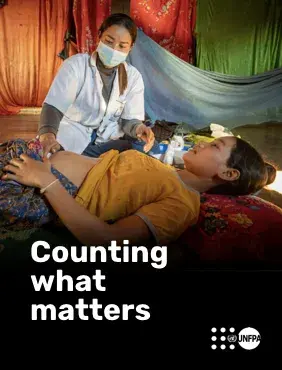The coronavirus disease 2019 (COVID-19) pandemic has significantly disrupted health services throughout the world, especially for maternal and newborn health. It is estimated that there will be significant increases in maternal and perinatal deaths due to the direct and indirect impacts of the pandemic. Addressing the impacts of the pandemic on sexual, reproductive, maternal, newborn, child and adolescent health has been a key focus of the United Nations Population Fund (UNFPA), with attention given to the protection of health personnel, the improvement of hygiene standards in facilities, and the maintenance of essential health services.
Maternal and perinatal death surveillance and response (MPDSR) is a key initiative to improve the quality of care for maternal and neonatal health and end preventable maternal and newborn deaths. Evidence suggests that, if maternal and perinatal death reviews are completed and recommendations implemented alongside training and development of local leadership, a 30–35 per cent reduction in maternal and perinatal mortality can be observed (1).
Given that many services and systems have been disrupted by the pandemic response, it is possible that the same has happened to MPDSR. The aim of this project was to understand if disruptions to MPDSR systems and processes had occurred during 2020–2021 compared with previous years’ reporting. If the key system that is meant to record and respond to maternal and newborn deaths is not functioning to its full extent, then there is a risk that not all maternal and newborn deaths are being captured and the true impact on maternal and newborn mortality is then not fully understood. The findings, along with emerging evidence on the effects of the COVID-19 pandemic on maternal and newborn health outcomes, provide a current picture of where challenges lie, and where interventions need to be focused.
A rapid stocktaking process was undertaken to understand the impact of COVID-19 on MPDSR. Data were collected through a survey developed for this purpose. UNFPA sexual and reproductive health (SRH) focal points were asked to complete the survey in partnership with those responsible for MPDSR within the corresponding ministries of health. Questions sought to identify disruptions of general maternal and newborn services and of the specific MPDSR system (or reporting system in place, if not MPDSR), both prior to and after the commencement of the COVID-19 pandemic.
The survey was sent to 22 UNFPA country office SRH focal points, and 17 responses were received (77 per cent response rate) by the end of September 2021.
Overall, 13 of the 17 (76 per cent) countries surveyed use the current full MPDSR system. Two of the 17 (12 per cent) countries have implemented a previous version that did not include perinatal deaths, maternal death surveillance and review (MDSR), but these countries planned to implement the perinatal reporting component in the coming year.
All countries reported varying degrees of disruption due to COVID-19, particularly at the beginning of the pandemic, when health systems were overwhelmed. The most frequently reported issues were with lack of completion of mortality reviews. Facility deaths continued to be reported, with some countries reporting a closer focus on this, as concern grew about the effects of COVID-19 on pregnant women. However, notification of community deaths was an issue, with a significant reduction in notifications. This is concerning, as anecdotal and some health management information systems data showed reductions in institutional deliveries, leaving mortality outcomes of pregnancy and deliveries potentially unreported. Numerous countries reported delays in receiving notifications, though, citing the redeployment of staff as the primary issue.
Eleven countries out of 13 (85 per cent) reported that the number of MPDSR review committee meetings reduced during 2020–2021, while only two out of 13 (13 per cent) reported that these continued as usual. One country reported that the number of MPDSR review committee meetings increased during the pandemic and involved representatives from universities and ministries meeting online to discuss the main issues found in maternal and perinatal death reports. Other countries reported decreases and delays in committee meetings, at both facility and provincial/capital levels, as facility staff were redeployed to COVID-19 activities, and provincial/capital staff were planning vaccination campaigns and health information for COVID-19 prevention campaigns.
Most countries reported that there were limitations in recommendations being generated, disseminated and integrated into practice. Some reported the introduction of policies around reducing face-to-face meetings and the reduction of movement between capitals and provincial areas. Other issues identified focused on confidentiality concerns in an online environment where sensitive issues needed to be discussed.
Despite the major challenges that most countries reported with MPDSR processes during the pandemic, there were positive innovations and opportunities that arose during this time, including online training.
Countries in the earlier phases of MPDSR implementation may require further support, as interruptions from the COVID-19 pandemic have caused delays in setting it up. Even those countries that have well-established MPDSR systems reported disruptions at many levels and may require support to identify where the system failed and how to reinvigorate it.
This review makes a number of recommendations that may assist future strengthening of MPDSR.
© UNFPA Asia Pacific Regional Office
This report was commissioned by UNFPA Asia Pacific Regional Office to the Burnet Institute. Special thanks to Kara Blackburn, Rachel Smith and Caroline Homer (Burnet Institute), Animesh Biswas (UNFPA Bangladesh) and Catherine Breen-Kamkong and Federica Maurizio (UNFPA APRO) for their work in the analysis and preparation of the report.


